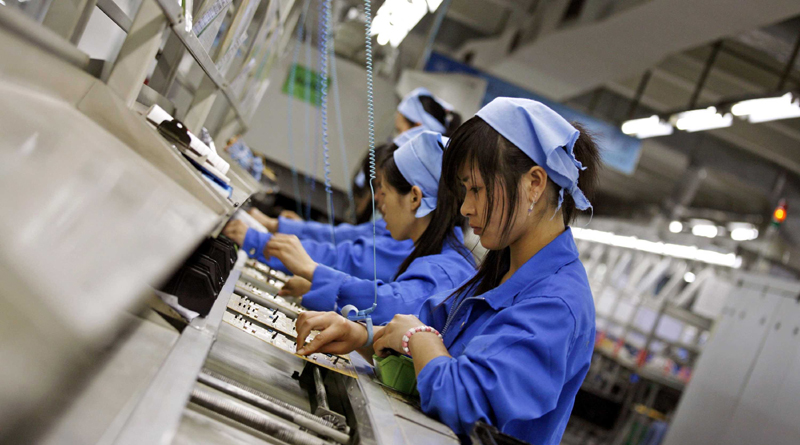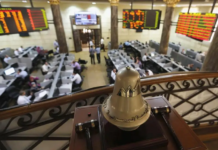by Maye Kabil
Fears of a China-led slowdown in global economic growth are leading financial markets, two weeks after the Chinese decision to devaluate the Yuan. Shares are falling across the globe on increased signs of China’s economic troubles, which have spurred competitive devaluations in emerging markets.
Gold is close to its highest level in almost seven weeks, as worries over a slowing Chinese economy pushed investors away from risky assets.
Although the Asian giant is the keyword in this panic, it was not the only factor, oil price contributed by hitting levels unseen since 1986. The worries about China also contributed to putting more pressure on oil prices, since it is one of the main consumers of energy in the world.
Across the continents stock market indexes are moving down, including those of Egypt and Arab countries, especially Saudi Arabia, which was affected badly by sinking oil prices.
Mohamed A. El-Erian, chief economic adviser at Allianz, mentioned the slowdown of the Chinese economy in his article about the future of oil prices. He thinks that that many factors are pushing oil prices even lower in the coming future, among them the weakening of the global economy.
“Much of the weakening was occurring in relatively energy-intensive countries such as China and Brazil, as well as Russia,” he stated in an article published on the website of project syndicate.
The wave that is still hitting the markets started two weeks ago, when China’s central bank abruptly devalued the yuan by nearly 4.6 per cent over three days. First it was moved by 2 per cent, which was the largest single-day drop since 1994. The following day, China’s central bank eased another 1.6 per cent, and on the third day it deducted an additional 1.1 per cent of the currency’s value.
The devaluation signals that “something is wrong”, the Chinese central bank must know something that rest of the world does not, and that’s what sent stock markets on their roller coaster ride, according to many analysts.
“So you have the world’s second largest economy, which has been a big tailwind for global growth… suddenly sputtering,” Mike McDonough, chief global economist at Bloomberg Intelligence, told the American Public Broadcasting Service. “So this tailwind is becoming a headwind. That’s the real concern. It’s not the devaluation.”
In fact, China’s growth rate has dropped to 7 per cent, a high number almost anywhere in the world, but low in a country that averaged 10.6 per cent growth in 2010.
Recently, there has been a slowdown in property investment, construction has lagged, and consumer spending is down.
China’s government uses the US dollar as benchmark against which they manage their currency’s value — a policy dating back to the mid 90s. However, in the past two years, as the US dollar appreciated in value, China’s economy slowed, making it increasingly difficult for the government to justify pegging the yuan to the dollar.
For the three months leading into August, the Chinese government had kept the yuan-dollar exchange rate fixed in a tight range around 6.115 yuan to the dollar
An 8 per cent decline in Chinese exports in July likely served as the immediate catalyst for the intervention, Credit Suisse economists say. In a little-noted advisory to government agencies, the cabinet said it was essential to fix the export problem, and the currency had to be part of the solution.
Chinese goods were more expensive than rivals’ products overseas. The currencies of other emerging markets had fallen, and China’s exporters could not easily compete. Soon after, the Communist Party leaders issued a statement also urging action on exports. If officials did not act, they would risk deeper turmoil at home, threatening the stability of the government.
Because the yuan heavily influences regional exchange rates, China’s devaluations have hurt other Asian currencies as well. The Indian rupee, Indonesian rupiah, and Thai baht fell 2.7 per cent, 2.6 per cent, and 1.4 per cent, respectively, against the dollar over the past week.
Investors in stock markets were fearing a currency war. On one hand, they are afraid of further reductions for the Yuan, although the central bank assured that there is no need for such a step. On the other hand, they fear that other countries will depreciate their currency, to have their exports more competitive, particularly as most countries, including those in the developed and industrialized world, have few growth-boosting policy tools left open to them.
Beyond the Yuan, signs of economic slowdown are creating problems elsewhere in an economy already rattled by a real estate slump. Across the country, millions of workers and thousands of companies are feeling the pain, as sales slip and incomes drop.
While China lacks reliable unemployment statistics, the labour market is under significant pressure. Pay is barely climbing faster than consumer prices. Millions of Chinese are looking for work.
For the most part though, US manufacturers and the fund managers investing in them say they are looking beyond short-term investor anxiety to long-term demand.
“Longer term, we’re still very bullish on China,” Hau Thai-tang, head of global purchasing at Ford Motor Co, told investors at a conference, according to Reuters.















